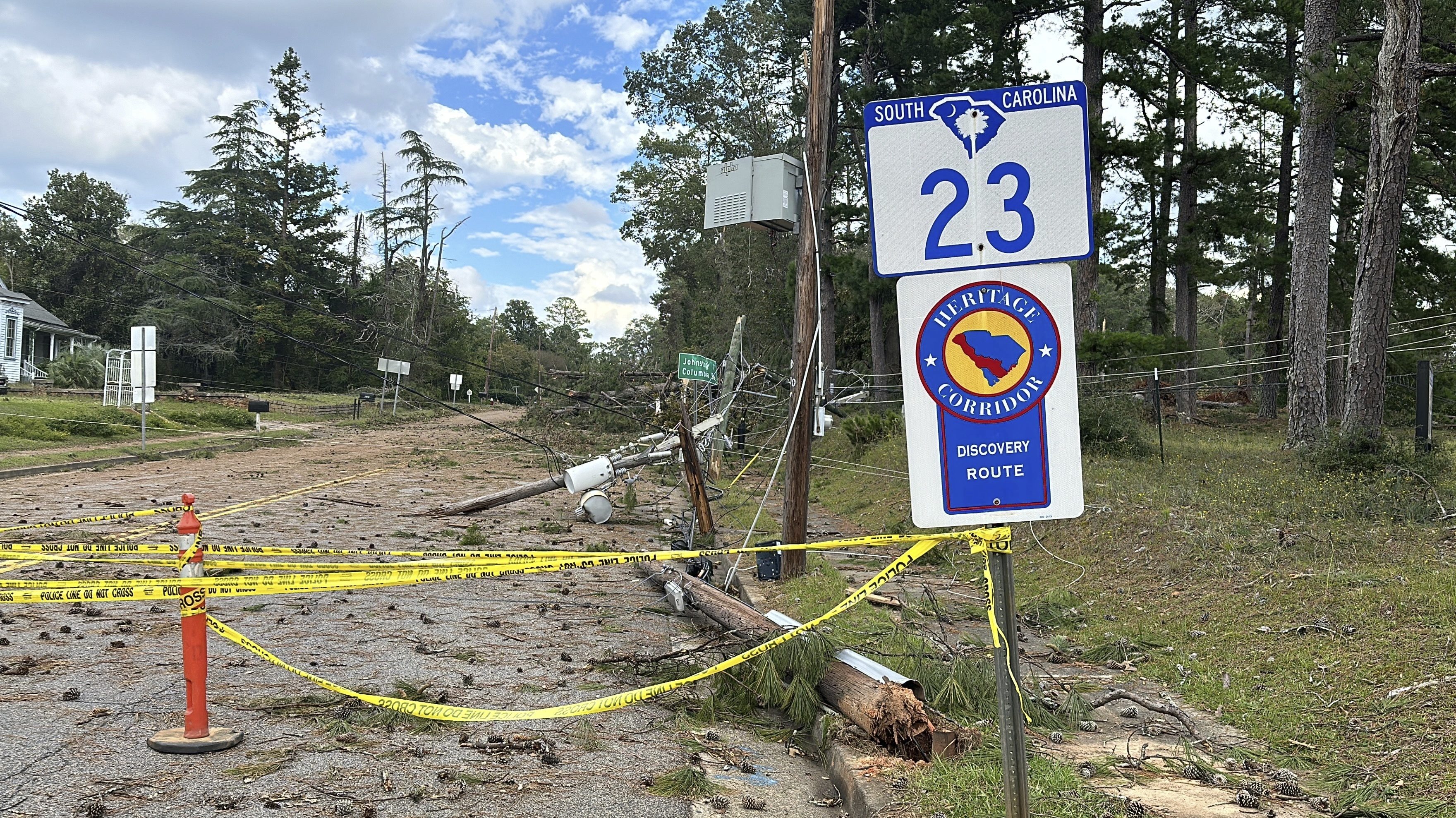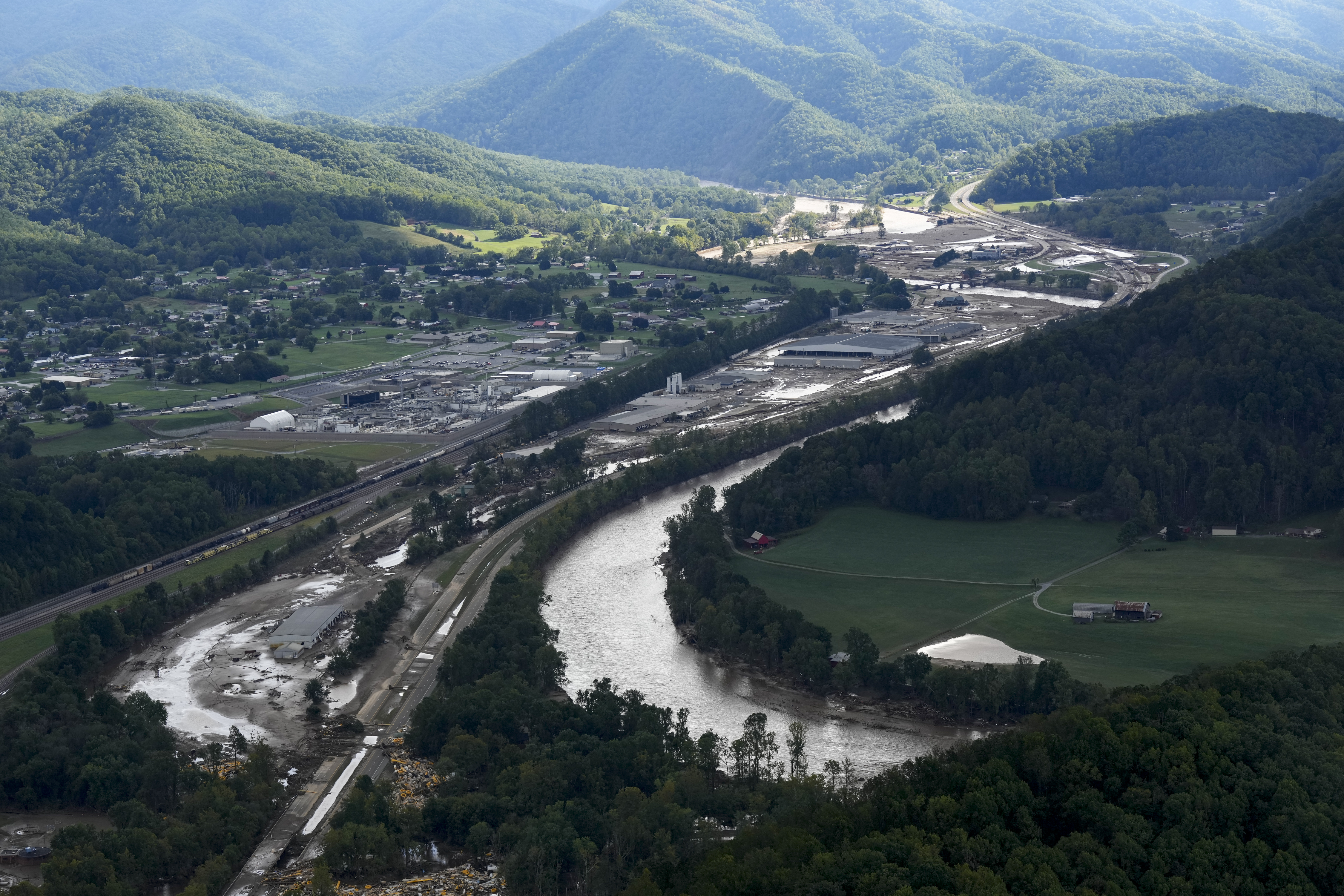Flattened homes, impassable roads, swamped fields, downed power lines, raw emotions.
Nearly a week after Hurricane Helene pummeled this small mountain town 20 miles east of Asheville, residents and business owners were trickling back Wednesday to see what was left and what could be salvaged.
Beverly and Baxter Eller barely escaped the floodwaters that reached eye level as they fled their home of 37 years and drove off in search of higher ground, uncertain if they would ever return.
When they did, they found their home surrounded by a knee-high moat of muddy water, the garage lifted from its foundation and spun around.
Beverly Eller, 68, who has been staying in shelters the last few days, said she was surprised by the extent of the damage.
“I don’t think anybody, including the government, thought this was what we were gonna get,” she said.
The Ellers retrieved what they could from the now-uninhabitable house, including family photos, mementos and most importantly, Christmas lights and ornaments that been passed down for five generations.
The death toll from Hurricane Helene rose to 176 on Wednesday as President Joe Biden directed the Pentagon to deploy up to 1,000 active-duty soldiers to North Carolina to help deliver food, water and other supplies to isolated communities like Swannanoa.

Biden, who flew into the state for a briefing at the Emergency Operations Center in Raleigh, was expected to survey the widespread damage across western North Carolina from the skies.
Get a weekly recap of the latest San Francisco Bay Area housing news. >Sign up for NBC Bay Area’s Housing Deconstructed newsletter.
“It’s too much for me in terms of interrupting access to help there, to land in Asheville, to survey the damage other through the air,” Biden said. “And then it’s my plan to travel to Georgia and Florida as soon as possible after that.”
In North Carolina alone, at least 90 people were reported dead Wednesday and thousands more were still missing.

Search and rescue teams used bright orange spray paint to mark the structures and cars they had already searched for bodies.
In Swannanoa, the floodwaters were at least 10-feet high in some spots, local law enforcement officials told NBC News.
"We're going to every part of our community, knocking on each door and asking residents if they need anything or want to be evacuated," said Swannanoa Fire Chief Anthony Penland, who has been sleeping on a cot in his office.
"Some parts of our community are inaccessible due to the roads being washed out. The infrastructure is gone," Penland said.
The Whitson Avenue Bridge that crosses the Swannanoa River collapsed when the river swelled with a sudden downpour of 9 inches of rain and overflowed its banks, he said.

Outside, in tiny downtown Swannanoa, hundreds of emergency workers and construction crews were working nonstop to restore the electricity and city services.
Brown mud coated the few buildings still standing. Many other structures were reduced to splinters. And whenever the wind kicked up, the smell of dust and dirt filled the nostrils.
Longtime resident Robert Starks, a 64-year-old disabled Army veteran, shook his head in dismay as he roamed down streets littered with destroyed cars and household items that had been flushed out of flooded homes.
“To see people losing homes and businesses hurts deep inside," he said. "A lot of folks are devastated and crying and bodies are still being recovered.”
Starks said he hasn't dared use the toilet in his apartment because it's the only fresh water he has left since the storm struck.
“People didn’t heed the warning to get out," he said. "We knew there were flash flood warnings but we had no idea this place would get turned upside down.”
Starks said he hopes his brother in Pine Bluff, Arkansas will come get him.
“It’s gonna be a long time before they get the electric back on,” Starks said.
Stewart Cody, who owns a local body repair shop, estimated that it would take at least two months of cleaning and repairing before he would be able to reopen.

Cody said it was going to cost him dearly because he didn't carry insurance on his business. But right now his focus was on helping his community get back on its feet.
“We have to come together for our neighbors,” Cody said.

Like others interviewed in the town, Cody said there was nobody to blame for not better preparing them for this storm. He said Helene came in the wake of several days of rain that was already putting pressure on the dams in the area.
“I don’t think anybody understood the amount of water that was gonna be pushed in,” he said. “We’ve never had that kind of water.”
This story first appeared on NBCNews.com. More from NBC News:



